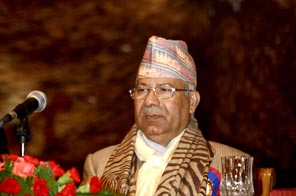Nepal adopts one-China policy: PM
KATHMANDU: Prime Minister Madhav Kumar Nepal, who is currently on the official trip to the People’s Republic of China, addressed an interactive programme held at Tsinghua University — one of the topmost institutes of higher education in China , today.
Speaking on the theme “current political scenario in Nepal and Nepal-China entente”,
PM Nepal said that the fundamental bedrock of political relations between the two countries was the pursuance of one-China policy adopted by Nepal and recognition of Taiwan and Tibet autonomous regions as integral and inalienable parts of China.
“We have always followed the policy of not allowing the use of our territory against our neighbours. We are pleased that our two most important and immediate neighbours — China and India — have made tremendous progress in social, economic and technical fields,” he said.
The PM added that Nepal was seeking to accelerate the pace of its social and economic transformation by taking the advantage of the progress made by her neighbours. “Nepal is willing to serve as a bridge and transit between these two fast and developed countries for our collective advantage,” PM said.
According to the Ministry of Foreign affairs, PM Nepal reasoned that in the changed political and economic contexts, Nepal was eager to further promote bilateral ties with both the countries and interlink economic, technical, trade and investment policies for the mutual benefit. “We realise that as relations between China and India grow at various levels, there are even better prospects of developing trilateral co-operation involving Nepal, China and India for undertaking some important development projects in Nepal on a win-win basis to promote regional development and improve the quality of life of millions of people in our region,” he added.
PM Nepal pointed out the need to improve connectivity between the two countries in terms of air-links and road networks and promote the bilateral trade and economic cooperation.
“On our part, we have to give emphasis on employment generating activities in our rural and remote areas, particularly in the northern parts of the country, which have great diversity in terms of topography and accessibility, and adopt suitable technology to promote balanced, integrated and inclusive development that has been the clarion call of our time,” he added.






